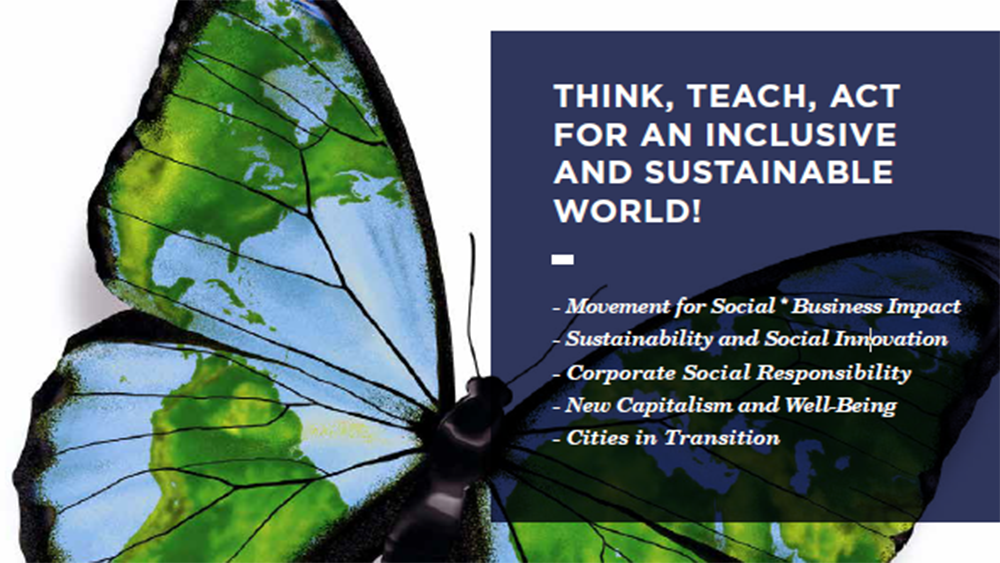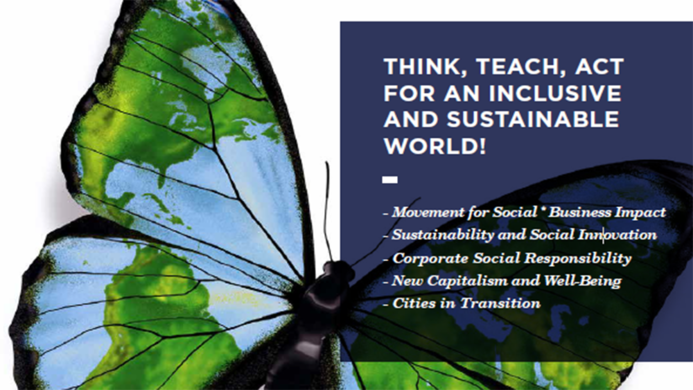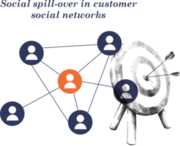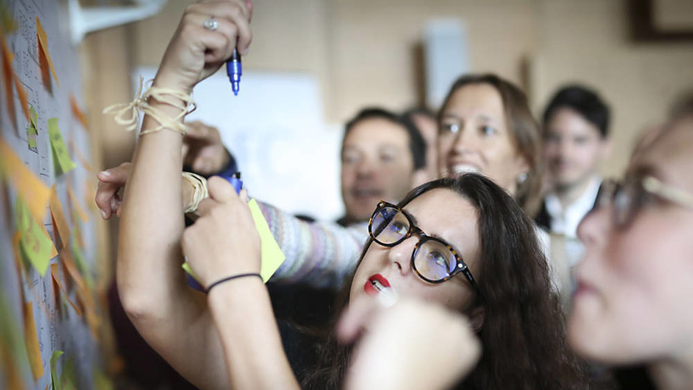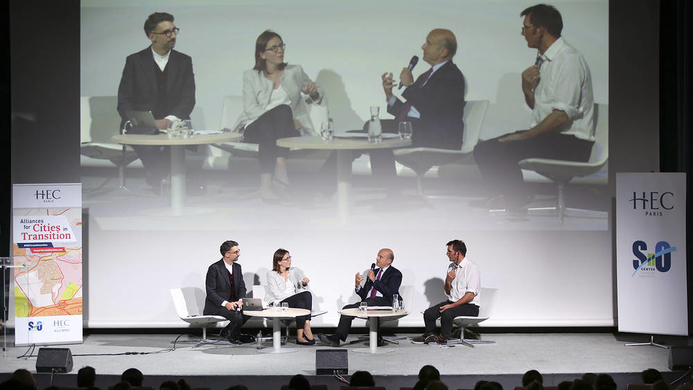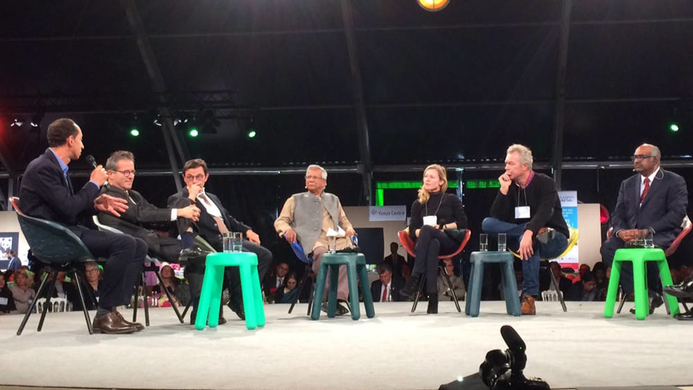“The scientists are adamant: we only have a 5% chance of reaching our goal of limiting global temperature increase to 1.5°C before 2100!” There is no denying the sense of urgency in the message Rob Hopkins, repeated again and again during his 12 hours of exchange with HEC students, staff members and guests from civil society and local government. The writer based his assertions on a chilling July report published by Nature Climate Change. The article’s five authors develop a joint Bayesian hierarchical model for GDP and carbon intensity, and conclude that trends in gas emissions, population growth and the economy mean there is a 99% likelihood the planet will go over the 2% threshold established in the COP21 Paris climate agreement. “Given this prognosis, we cannot wait around for business policies, measuring systems and political decisions to be implemented before acting ourselves,” insisted the founder of the Transition Network on his return to Jouy-en-Josas. “Time is running out.
”Over the course of an unusually warm autumnal day on October 19, this message was echoed by Julien Dossier, who has been teaching the Sustainable Cities course at HEC since 2010. The founder of Quattrolibbri insisted the hands-on involvement on October 19 indicated a “massive scale-up” from last year’s S&O conference. That 2016 Finance For Good Conference had explored the role of the financial sector in the current energy transition and the challenges of aligning financial incentives with inclusive growth. “This year, you could feel a heightened sense of concern about practical alliances, which were echoed by summits and debates elsewhere,” explained Dossier. “It underlines how attempts at building alliances is the most urgent issue we have to work on today. You know, our timetable is getting tighter and tighter.”
HEC Paris, a School for Transition
Indeed, a few days later, leaders of some of the world’s largest cities met in Paris in a C40 Together4Climate summit to discuss ways to rebuild healthier metropolises worldwide, starting with the air. “We represent 650 million citizens,” had declared the network’s president and Paris Mayor Anne Hidalgo. “We need to forge alliances,” she pursued, echoing the title of the HEC conference, as the Mayor reached out to the private sector and civil society.
“Paris has launched a carbon-neutrality policy. That’s not to be under-estimated as an initiative!” exclaimed Dossier, who is involved in a drive for Paris to enjoy carbon neutrality by 2050. “The magnitude of change required is prodigious. But Paris needs help. As a community of researchers, students, professors and alumni, HEC Paris could become a school of management of this transition, a beacon and reference for the rest of the world.”
Can Les Mureaux Inspire the Rest of France?
The S&O conference centered on local communities and their quest to mobilize all actors for to a zero carbon-imprint, sustainable and resilient habitat. Much of the day was devoted to practical roadmaps for small communities like Les Mureaux and Jouy-en-Josas, or smart cities like Fort d’Issy, and larger conurbations such as Versailles and Luxembourg. “What’s going on in Les Mureaux is simply brilliant,” said Rob Hopkins, fresh from an evening of debate, exchange and music in the Paris suburb. “In the past, this community had a sense that France had turned its back on it [[Ed., after rioting in the 2000s and the scaling down of a local Renault factory from 30,000 to 3,000 employees]. And now they’re transforming the place into a tourist destination, tapping into the cosmopolitan nature of the population! Locals aim to make it a culinary center, create France’s best urban farming project; invent the coolest local currency; and offer the best music around. If it works, Les Mureaux’ ecosystem can become a model to inspire the rest of France.”
An actor of Les Mureaux’ development is Jean de Wailly (H96). The Global account executive at Sodexo Benefits and Rewards Services has spent the past year working with local associations and leaders to build a territorial pole for economic cooperation (PTCE). “There are over 100 nationalities represented in this community of 30,000 people. Their diversity used to be labeled “difficult”. Then it became “a challenge”. But nowadays, it’s “an opportunity” and we aim to capitalize on it, using the rich network of local associations and supportive local business outlets. Sodexo, in association with S&O’s Action Tank, is backing the PTCE because it federates a lot of creative energies into one geographical location.”
Earlier in the day, Jean de Wailly participated in an informal workshop involving HEC researchers, Les Mureaux activists and Rob Hopkins. Together, they explored the benefits and challenges of further federating the population by establishing its own local currency. “Why should it matter?” asked HEC Assistant Professor Eric Mengus rhetorically. For the past year, Mengus has been working on this question as part of HEC’s Movement for Social Business Impact. “Because,” he answered, “it impacts on local issues like amenities, health and education. Local currencies could be a potential tool to alleviate local public good accumulation problems in poorer neighborhoods. But it is important to clarify the conditions of their implementation and the channels through which they lead to real effects on local economic and social outcomes.”
Historically, currency has been at the heart of the burgeoning migrant community in Les Mureaux. Much of the revenue returns to the community’s workers’ homeland, principally in West and North Africa. For the past year, Senegalese student Abdoulaye Bocar Lom has combined his Master’s studies at University Paris VII with fieldwork in the community and volunteering for the PTCE. “I’m inspired by what’s going on at Les Mureaux,” he confides, “and I hope to replicate much of what I see in my hometown of Thilogne, in northeast Senegal.” The international dimension of Les Mureaux gives further resonance to its experimentation on sustainable development, a further motivating factor for both HEC and Sodexo.
“Fulfilling” Roadmaps to the Cities of the Future
The S&O conference also featured the lively involvement of HEC students in debates on smart cities like Fort d’Issy and Luxembourg, as well as a workshop to design roadmaps for 2°C cities. In the latter, SASI student Sommia acknowledged the diversity of factors involved in creating sustainable communities: “I thought it only boiled down to urban planning,” the Canadian from Calgary said, “but I can see there are important components that inter-act.” He pointed to the elaborate network diagram designed by Julien Dossier, called “the post carbon fresco”. “That’s a great tool to guide your trail of thoughts, giving both the areas to focus, for example energy, and the wider picture. I contributed a few ideas including volunteer gardening services to bring HEC students and Jouy residents together. It gives us an opportunity to work with our hands and is also a humbling experience.
” Another student insisted on the “laboratory” for participative democracy that Les Mureaux is becoming. “The entire population is taking public decisions on all the key issues factoring into their daily lives,” he said. Such day-to-day democracy, he added, is essential in guaranteeing the development of such a culturally diverse community.
“What impresses me most at this workshop is the richness of the visions shared by this younger generation,” said Nathalie d’Estienne d’Orves-Cossé, director of major infrastructure projects in the Versailles municipality. She contemplated the vast network diagrams covered in Post-it suggestions from the participants, “They have a very different appreciation of the hierarchy when building the city of tomorrow.”
For the deputy Mayor of neighboring Jouy-en-Josas, François Brégout, meanwhile, it is vital to gradually draw his fellow-citizens into new alliances for sustainable development, capitalizing on a step-by-step approach. “It’s not been easy. Sure, they are attracted to projects for better nutrition, for example. But they are not aware that there are also questions of ethics, transport, education and good governance, behind what they eat. With HEC-Jouy proposals around permaculture, for example, we can unite our visions and energy around far more ambitious joint projects.
HEC Paris is playing a very active and supportive role by using its connections to bring all the actors together.
"No Longer Drumming Alone in the Desert"
“I’m encouraged by what I’ve seen grow here,” underlined Rob Hopkins. “HEC Paris is playing a very active and supportive role by using its connections to bring all the actors together. The S&O’s approach is two-fold: it encourages a bottom-up community paradigm, focusing students’ attention on off-campus activities and real-life projects, in Les Mureaux for example. At the same time, it harnesses companies like Sodexo, and local dignitaries to support these projects.”
This enthusiasm was shared by LREM Deputy and former HEC student Amélie de Montchalin. She shared her father’s experiences as a local farmer: her family happens to be the owners of a neighboring Saclay plateau farm which came to terms with the arrival of the business school and its sprawling campus in the early sixties. During the keynote exchange closing the daylong conference, the politician issued a clarion call to students, urging them to learn to love complexity and feel safe to innovate.
For Julien Dossier, the day brought a positive energy he hopes will grow. “It’s been very uplifting for people like us who have spent years on this work. I no longer feel like I’m drumming alone in a desert, there’s a collective effort and consciousness which is growing.
“But,” he cautioned, “HEC must look beyond the students from SASI, specialized Master’s classes or the S&O, all actively engaged in this field. In this transition we also need experts in law, marketing, finance, human resources, and so on. They are all present at this school. My message to them is: ‘Let’s all work together, join forces with our alumni network, to leave the business-as-usual mode.’ This transition needs a proper management story! It’s about time we heeded the emergency and roll up our sleeves to design, implement and scale up climate compatible solutions.”
